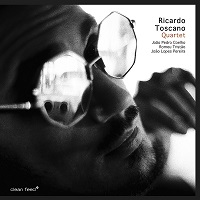Home » Jazz Articles » Album Review » Ricardo Toscano: Quartet
Ricardo Toscano: Quartet
Pianist João Pedro Coelho's low rumble introduces "Almeria," a tune of gentle pace yet smoldering passions. Romeu Tristão's bass ostinato and a crisp pressed roll from drummer João Lopes Pereira fire the quartet's ignition and launch Toscano, whose keening, blues-tinged solo soars over Pereira's animated stick work. Herbie Hancock's "The Sorcerer" sees the quartet toggle back and forth between measured stride and charging attack, with Toscano and Coelho both impressive.
Though not short of technique, Toscano's appeal lies chiefly in the emotive quality he imparts. On the ballad "Song of Hope," as the rhythm section treads softly, Toscano unfurls a beautifully tender solo, his breathy intonation resonating like the subtlest brushwork. The set's other ballad, "Lament," plows similar terrain to Coltrane's "Alabama" or "Lonnie's Lament," an impression created as much by Coelho's comping as the leader's bluesy cry. Tristão's breaks the spell with an unaccompanied solo of prayer-like reverie before Toscano returns to lead the quartet out.
"Our Dance," which features the elegant Coelho, is also an advertisement for the rhythm section's intuitive interplay—honed by four years of playing Portugal's jazz clubs and major festivals. A Toscano vamp towards the end liberates Pereira, who works his kit industriously, though once the sparks have abated the quartet makes a soft landing. At nine minutes "Grito Mudo" is the album's longest track, and arguably the most personal statement to boot. From the impressionistic opening platform, where space is employed to atmospheric effect, first Coelho and then Toscano redirect the music. Pianist and saxophonist eventually combine in a meandering, abstract passage before the saxophonist locks horns with Pereira in improvised dialogue, though one where neither melody nor mutual empathy are sacrificed at the altar of freedom.
Toscano's debut outing might not break too many molds, and in fact, the music is often stylistically derivative, but on the flip side the quartet's playing is assured and emotionally engaging. Whilst it may all sound a little familiar, there is no escaping the passion and heart in the collective playing. A confident though measured first step then, with the promise, as the musicians' personalities grow, of greater things still to come.
Track Listing
Almeria; The Sorcerer; Song of Hope; Our Dance; Lament; Grito Mudo.
Personnel
Ricardo Toscano: alto saxophone; Romeu Tristão: double bass; João Pereira: drums; João Pedro Coelho: piano.
Album information
Title: Quartet | Year Released: 2018 | Record Label: Clean Feed Records
< Previous
Eyolf Dale at April Jazz
Next >
Nyskudd
Comments
Tags
For the Love of Jazz
 All About Jazz has been a pillar of jazz since 1995, championing it as an art form and, more importantly, supporting the musicians who create it. Our enduring commitment has made "AAJ" one of the most culturally important websites of its kind, read by hundreds of thousands of fans, musicians and industry figures every month.
All About Jazz has been a pillar of jazz since 1995, championing it as an art form and, more importantly, supporting the musicians who create it. Our enduring commitment has made "AAJ" one of the most culturally important websites of its kind, read by hundreds of thousands of fans, musicians and industry figures every month.



















